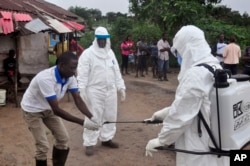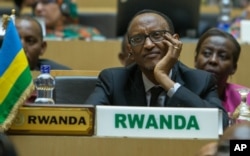People in a number of African countries, including Burundi, Benin, Rwanda, Guinea, Liberia, Tanzania, Madagascar, and Togo, are the least happy people in the world, according to the World Happiness Report 2016.
Jon Clifton, managing partner with the U.S.-based global research company Gallup, said the report took into account countries' per capita gross domestic product, life expectancy, corruption, social support and freedom to make life choices as indicators of happiness.
“The report actually identifies that there are six things that contribute. The single biggest is actually GDP per capita or income. The other five are trust, life expectancy, social support, freedom, and generosity,” he said.
Ebola crisis
Clifton said the deadly Ebola in West Africa contributed to Liberia’s poor standing in the rankings because a lot of well-being within a country can be determined by recent events.
“When we asked something about whether or not they experienced a lot sadness or anger, physical pain, Liberia is among the top 10 in the world. So, a lot of it can be event-driven by things like Ebola they experience because our interviews were actually conducted May of last year,” Clifton said.
He said one of the big strengths of Africa is its social support, which was measured by asking respondents if they were in trouble, do they have relatives or friends you count on to help you whenever you need them or not.
“What we found is that in 36 countries where we conducted this survey last year, in 33 of them, over a majority of people said yes to that. So there’s a huge strength in Africa when it comes social support,” Clifton said.
Corruption
But Clifton said corruption in government continues to be a hindrance for Africa’s progress.
"For example, we asked people all through Africa: 'is corruption widespread throughout the government in this country or not?' We were able to ask that in 34 different countries, and in 30 of those countries 50 percent or more people said they believe corruption was widespread through the government,” he said.
Clifton described Rwanda as an “outlier” because despite the fact that Rwanda has been referred to as the Singapore of Africa, the country is not doing that well when it comes to how people see their lives.
“When it comes to how people see their lives, they are not doing that well, particularly when compared to their GDP per capita. So Rwanda is a bit of an anomaly that I think is worth further explanation because people see their lives worse than they should quite frankly,” Clifton said.
Denmark ranks happiest
The World Happiness Report 2016 said Denmark is the happiest country in the world, followed closely by Switzerland.
Other countries among the top 10 happiest countries are Iceland, Norway, Finland, Canada, Netherlands, New Zealand, Australia and Sweden.
The report comes ahead of this year’s U.N. World Happiness Day, March 20, and Clifton said there’s a lot of lessons world leaders can draw from the report, including the new data on how people say their lives are going.
“I think before we used to use indicators like GDP per capita, for example to understand or to tell us whether or not the society is doing well or not. The challenge with that is that you can increase GDP per capita by doing certain economic activities, but it necessarily means that somebody’s life is getting better. These indicators by simply asking the experts themselves who are the people of these countries to tell us how their lives are going could be one of the best, if not the best indicator on whether a society is functioning or not,” he said.






